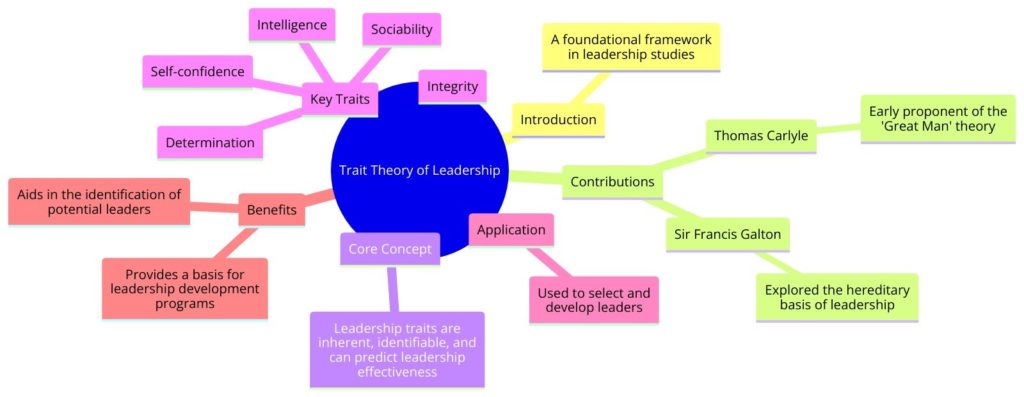Trait Theory of Leadership
The Trait Theory of Leadership, particularly as it relates to the contributions of Thomas Carlyle and Sir Francis Galton, is one of the foundational frameworks in the study of leadership. This theory posits that certain inherent traits and characteristics are indicative of effective leadership. While leadership theories have evolved significantly over time, the Trait Theory laid the groundwork for understanding what makes individuals effective leaders.
What is the Carlyle & Galton Trait Theory?
The Trait Theory of Leadership suggests that individuals are born with certain traits or qualities that predispose them to be leaders. Thomas Carlyle, a 19th-century historian and philosopher, was one of the early proponents of this idea through his “Great Man” theory, which argued that history is shaped by the impact of great men with inherent characteristics of leadership. Following Carlyle, Sir Francis Galton, a 19th-century polymath known for his pioneering studies in psychology and genetics, further explored the notion that leadership qualities were hereditary, laying the groundwork for the Trait Theory in leadership.
How It Works
The theory identifies a range of traits believed to be associated with effective leadership. These traits have traditionally included qualities such as:
- Intelligence and wisdom
- Self-confidence
- Determination and tenacity
- Integrity and honesty
- Sociability and charisma
The idea is that individuals who possess a higher incidence of these traits are more likely to be effective leaders. Researchers and scholars have conducted numerous studies to identify these key traits, with the goal of creating a definitive list of characteristics that could predict leadership success.
Why It Is Valuable
Despite its age, the Trait Theory of Leadership offers several valuable insights:
- Basis for Leadership Development: By identifying key traits associated with effective leadership, organizations can design development programs that nurture these qualities in potential leaders.
- Selection and Recruitment: Trait Theory can inform the selection and recruitment processes by highlighting qualities to look for in candidates for leadership positions.
- Personal Development: Individuals can use the framework to conduct self-assessments and understand areas where personal development could enhance their leadership potential.
When and How to Use It
The application of Trait Theory is most evident in leadership development, selection, and assessment processes. For example:
- In recruitment, organizations might prioritize candidates who exhibit strong leadership traits identified by the theory.
- In leadership development programs, the focus could be on nurturing and enhancing these traits among emerging leaders.
- Individuals can use the theory as a self-assessment tool to identify their strengths and areas for improvement in the context of leadership.
Shortcomings/Criticisms
Over the years, the Trait Theory of Leadership has faced several criticisms:
- Lack of Universality: Critics argue that the theory fails to account for the situational context—what makes a leader effective in one scenario might not apply in another.
- Oversimplification: The theory has been criticized for oversimplifying leadership by suggesting that only inherent traits matter, ignoring skills and abilities that can be developed.
- Underestimation of Environmental Factors: It overlooks the impact of external factors, including team dynamics, organizational culture, and socio-economic conditions, on leadership effectiveness.
- Predictive Limitations: The presence of certain traits does not necessarily predict leadership success, as it fails to account for the complexity and diversity of leadership roles.
While the Carlyle & Galton Trait Theory of Leadership has played a critical role in the evolution of leadership studies, it represents just one perspective in the broader discourse on what constitutes effective leadership. Its emphasis on inherent qualities offers a starting point for understanding leadership, but subsequent theories have built on and expanded this framework to include behavioral, situational, and relational aspects of leadership. Despite its limitations, Trait Theory remains a valuable tool for identifying potential leaders and understanding the complex nature of leadership.


